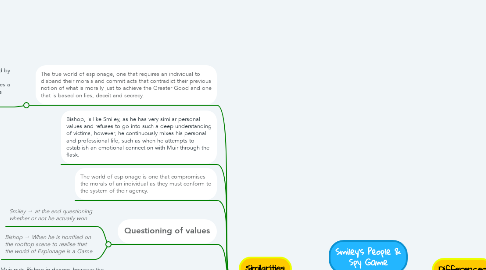
1. Similarities
1.1. The true world of espionage, one that requires an individual to disband their morals and commit acts that contradict their previous notion of what is morally just to achieve the Greater Good and one that is based on lies, deceit and secrecy.
1.1.1. Smiley seems to be consumed by the spy world, as he is also deceitful as seen when he hides a crucial piece of evidence in his Oxford English Dictionary.
1.2. Bishop, is like Smiley, as he has very similar personal values and refuses to go into such a deep understanding of victims, however, he continuously mixes his personal and professional life, such as when he attempts to establish an emotional connection with Muir through the flask.
1.3. The world of espionage is one that compromises the morals of an individual as they must conform to the system of their agency.
1.4. Questioning of values
1.4.1. Smiley → at the end questioning whether or not he actually won
1.4.2. Bishop → When he is horrified on the rooftop scene to realise that the world of Espionage is a Game
1.5. The Greater Good
1.5.1. Muir puts Bishop in danger, however the end result is a successful mission fulfilling Muir’s idea of the Greater Good.
1.5.2. "You have to let him go” ... “They will kill him!”→ Nathan has no regard for the person’s life → Lives are expendable.
1.6. Nathan has the same mentality/goal as Smiley despite the differing contexts → The Greater Good
1.7. Bishop can be seen being taught modernised versions of spying. He is being taught how to use new technology for example the Russian radio. Nathan on the other hand is teaching him more traditional methods. “Everything in the room is a snapshot” → Like Smiley inspecting Vladmir’s room and how he analysed the room.
1.8. This Moral Relativism is a philosophy that asserts there is no global or absolute moral law that applies to all people and is one that is evident in this text as demonstrated through Bishop’s and Muir’s opposing Moral Compasses.
1.8.1. Sacrifices his asset who has a wife and children → Lives are expendable → Bishop committing act that contradicts his morals
2. Differences
2.1. Context
2.1.1. John le Carré’s 1979 novel, ‘Smiley’s People’ remarks of the nature of the intelligence world, through his perceptions from his time as an agent
2.1.2. Tony Scott provides a commentary on the nature of espionage through the contrast of two very different yet similar characters, Tom Bishop and Nathan Muir, in his 2001 film ‘Spy Game’.
2.2. The end of Bishop’s career as a spy, was caused by him being unable to handle any further experiences of immorality and his decision to end the battle between his personal values and those of the spy world, whereas Smiley realises this much too late. In his quest to capture Karla, Smiley has lost himself and has been broken by sacrificing his values.
2.3. At the end of the novel, Smiley is under the guilt that capturing Karla has required him to also compromise his values, exploit the nature of the human condition and expose the flaws of society, however in in Spy Game, Muir feels a sense of accomplishment as he drives of into the country side with the notion that he had in fact obtained new values rather than lost any, other than his loyalty to the CIA.
2.4. Text Pace
2.4.1. The novel Smiley's People is very detailed and meticulous.
2.4.2. In Spy Game there is a sense of urgency such as with the monochromatic stand stills and time stamps.

